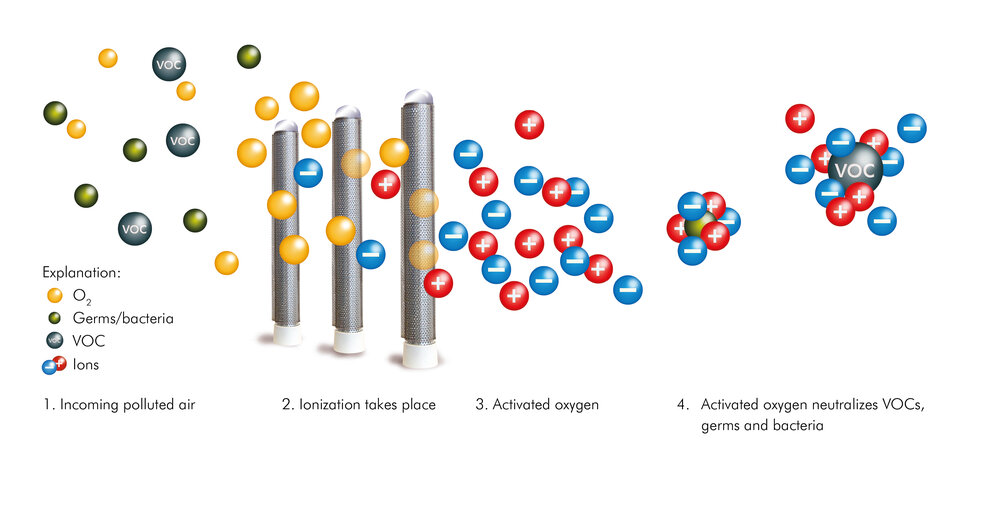Looking over the shoulder of nature
Air is the most important food for human beings. Each one of us inhales 20 kilograms of it each day. Hence, the quality of the air inevitably has an impact on the health and mental state of the human being – or to put it in other words: if the quality of the air is affected, this has consequences. For us as human beings as well as for our environment…
We instinctively consider that «seaside air» or «mountain air» is fresher than the air in our cities or indoors. We know that air from the mountains or at the seaside has a favorable impact on human health not only from our own experience but this has also been established by a number of studies. Yet another reason for this is the high concentration of ions – the electrically charged particles in the atmosphere and the natural content of ozone. At elevated locations or near the seaside, this natural concentration of ions may go up to 8000 ions per cubic centimeter, in the city about 20 to 200 and in ventilated or air conditioned rooms about 20 to 5[1] . Interestingly, even the concentration of ozone is higher with a higher concentration of ions and the daily average at elevated locations or near the seaside ranges from 30 ppb to 60 ppb. The concentration in indoor air is only 0 to 5 ppb.
[1] VDI Report no. 1877, atmospheric hygiene, 2005, Dr. Achim Keune, Pros and Cons of various methods for improving air, ISBN 3-18-091877-2

Ozone: Boon or Bane? The reporting by media in recent decades has stigmatized ozone. Apart from NOx and SOx, ozone has been epitomized by summer smog. In the process, what is forgotten as described above is that ozone in natural concentrations is an important constituent of air and takes over important functions. The formation of natural ozone occurs by ionization of the air. Thus, the ion content and ozone content of the air are correlated. In contrast to the natural formation of ozone, secondary formation is dependent on precursor pollutants such as NO2, methane, CO, among others[2].
A natural ratio of ions in the atmosphere supports absorption of oxygen by human beings optimally and fresh air has a naturally high concentration of ions. Ionization for cleaning the air takes place continuously in nature. The atmosphere, for example, gets ionized by the sun and wind. Ionization causes self-cleaning of the air. This is why we enjoy the days in the mountains or the moments of peace and calm at the seaside. The day-to-day routine, however, looks different: we spend more than 80% of our time indoors. Hence, the quality of the indoor air is a determining factor for our health, our well-being and our capabilities. This indoor air is influenced by various factors – for example, construction materials, selected carpets, outdoor air or the human activities indoor play a decisive role.
[2] Atmospheric load in 2015 - Measurement results of the National Observatory Network for Foreign Particles in the Atmosphere (NABEL); published by the Swiss Federal Office for Environment, BAFU and by the Swiss Material Testing and Research Institute, Empa; Bern (Switzerland), 2016


The SIA directive 382/1 defines qualitatively good indoor air if it has a CO2 proportion of 800 ppm to 1500 ppm (carbon dioxide molecules in one million air particles). Values above 2000 ppm are problematic from the perspective of indoor air hygiene. SUVA defines a MAK value for CO2 of 5000 ppm. Since the human being on his/her own produces CO2 by breathing and via the skin, the content of carbon dioxide increases if he or she remains in a non-ventilated room for a longer period of time. We get to sense this clearly in rooms where several human beings are present. Apart from the proportion of CO2, however, even a minimum level of pollutants is important for good indoor air. The pollutants comprise bacteria, germs, fine particles or nitrogen oxides and formaldehyde to name just a few.
Indoor air lacks the ions since the natural energy sources are absent. Thus, even the important process of natural self-cleaning of the indoor air does not take place. ionair emulates this natural cleaning process with certainty and in a controlled and regulated manner. ionair enriches the indoor air with oxygen ions, with which the air gets cleaned naturally. Ionization, thus, makes a significant contribution to healthy indoor air. Neutral in odor, germ-free and inspired by nature.



















